MaryAnn Bernal's Blog, page 8
November 3, 2020
New Release: Anno 2020 by James Morcan - FREE Kindle book launch promo this coming weekend November 7 - 8, 2020
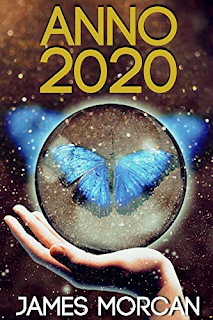
Set during Anno MMXX (Year 2020), this psychological novel explores five different relationships as people around the world are separated from each other due to the Coronavirus lockdown.
Praise for Anno 2020
U.S. Scientist/Reviewer E. Norris says: “An emotionally stirring novel and an around-the-world look at 2020, seen from various perspectives. I especially liked interconnectedness shown between all things.”
Purchase links
Amazon
***
About the Author

James Morcan
New Zealand-born actor/writer/producer James Morcan resides in Sydney, Australia. He has written two bestselling novels, performed in various international film productions, and is a podcast host. His books have been translated into eight languages (Arabic, Italian, Spanish, Portuguese, Norwegian, French, Afrikaans, German).
Morcan's published titles include the new release horror Silent Fear (A novel inspired by true crimes) and the bestselling historical adventures White Spirit and Into the Americas. He also has several series on the market including The Orphan Trilogy, an international thriller series, the swashbuckling action-romance series The World Duology, and the controversial non-fiction franchise The Underground Knowledge Series. An additional non-fiction title, Debunking Holocaust Denial Theories, was written in collaboration with Holocaust survivors to document the genocide. These titles were all co-authored with his father Lance Morcan and published by Sterling Gate Books. Their production company, Morcan Motion Pictures, is developing Silent Fear into a feature film and Underground Knowledge into a TV series.
James' most recent acting performance was a leading role in the post-Apocalyptic feature film After Armageddon which he also wrote. The dystopian adventure film was shot in rural Australia and Morcan co-starred with Berynn Schwerdt (Wyrmwood). Other leading roles include the OZ-Bollywood productions My Cornerstone and Love You Krishna. Morcan also wrote the screenplays for both features which were filmed in Sydney and Mumbai and incorporated English and Hindi languages.
Additional productions he has performed in include a BBC TV series, several indie features, and a live stadium production of Ben Hur headlined by Academy Award winner Russell Crowe. To date, his feature films have screened at cinemas in New Zealand, India, Australia, Italy, and Cannes.
James is a podcast host on the YouTube channel Underground Knowledge and founded one of the most popular discussion groups on Goodreads, also called Underground Knowledge.
Connect with James
October 29, 2020
Special Guest Interview with Christine Hancock, author of Bright Helm (The Byrhtnoth Chronicles: Book 4)
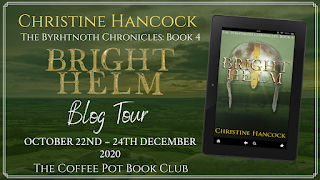

Christine Hancock
Today I have the pleasure of speaking with Christine Hancock, author of The Byrhtnoth Chronicles.
Please tell us a little about yourself.I am a wife, mother, and grandmother. I was born in Essex and moved to Rugby, in Warwickshire when I got married. I haven’t really done anything interesting – probably because I have spent most of my life with my head in a book.
When did you start writing?
January 2013. I had written a short story about meeting one of my ancestors on my Genealogy blog and found it difficult. Why was fiction different from non-fiction? I joined a class of writing fiction - the rest is history.
What projects have been published?
Bright Sword, the first in the Byrhtnoth Chronicles series, arose from that course. It was published (partnership contract) too soon, I now realize. The next three are self-published
Tell us about Bright Helm.
Bright Helm is the fourth in a series. It tells the story of Byrhtnoth, a real character who lived in 10th century England. He is famous for his death in AD991, defending the country from Vikings. My books are about his imagined early life and his search for the father who disappeared when he was a baby.
How did you select the title of your novel?
Byrhtnoth means Bright Courage (a good name for a hero!) and I decided to use the Bright part in the titles. The first, Bright Sword, was about his father’s sword. Bright Axe included a meeting with Erik Bloodaxe. Byrhtnoth’s deadly enemy is named Egbert – it means Bright Blade, and his father’s name was Byrhthelm: Bright Helm (or Helmet). And they all look good on the cover!
What was your inspiration?
The Battle of Maldon, the famous Anglo-Saxon poem about Byrhtnoth’s noble death. I also used to live not far from Maldon and attended the 1000 year anniversary re-enactment in 1991.
What are you currently working on?
The next book in the series, which follows the adventures of Byrhtnoth’s friend, Wulfstan. I am also thinking about a prequel about Byrhthelm.
What are you reading at the moment?
At the moment I am beta reading a book for another Anglo-Saxon author.
What do you like to do in your free time when you're not reading or writing?
What free time? I research family and local history. I am the leader of Rugby Local History Research Group, who have just published their eleventh booklet.
Do you have any advice for other authors?
Just write – it doesn’t matter what – the more you write the easier it becomes. But always find time to read as well.
And finally, can you tell us some fun facts about yourself?
I make wine from hedgerow fruit and flowers. For each of my books I have made Mead – the same as the wine but using honey instead of sugar. The Mead for Bright Helm is crabapple.
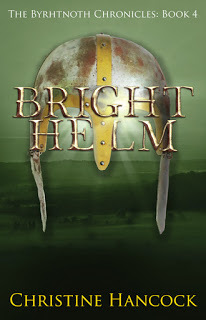
Separated by anger and unanswered questions, Byrhtnoth and Saewynn are brought together by a tragic death.
Re-united, they set out on an epic voyage to discover the final truth about his father.
The journey takes them far to the north, to Orkney, swathed in the mists of treachery, and to Dublin’s slave markets where Byrhtnoth faces a fateful decision.
How far will he go, to save those he cares for?
Buy Links:
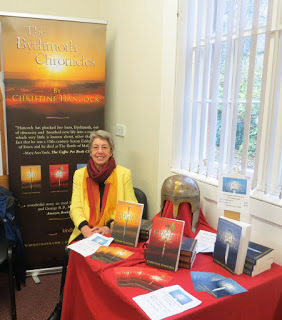
Christine Hancock was born in Essex and moved to Rugby, Warwickshire when she married. She and her husband have two sons and two lovely grandchildren.
She is a long term family historian, leader of the local history group, and town guide. Christine had never thought of becoming an author. She just wanted to write about some of her ancestors. In 2013 she joined a writing class. The class turned out to be about writing fiction. Before she knew it, she was writing a novel.
Byrhtnoth was a real warrior who died in the 991 Battle of Maldon, made famous by the Anglo-Saxon poem of that name. Growing up in Essex, Christine visited Maldon often, and attended the 1000 year anniversary of the battle in 1991.
She wanted to find out what made Byrhtnoth such a famous warrior. Christine finished the book but discovered it had become a series - how long, she has yet to find out.
Connect with Christine:
Website • Twitter • Facebook
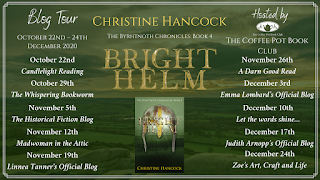
October 28, 2020
The Inspiration Behind The Potential for Love by Catherine Kullmann
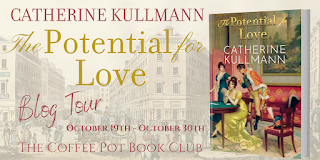
1816
For over six years, Thomas Ferraunt’s thoughts have been of war. Newly returned to England from occupied Paris, he must ask himself what his place is in this new world and what he wants from it. More and more, his thoughts turn to Arabella Malvin, but would Lord Malvin agree to such a mismatch for his daughter, especially when she is being courted by Lord Henry Danlow?
About to embark on her fourth Season, Arabella is tired of the life of a debutante, waiting in the wings for her real life to begin. She is ready to marry. But which of her suitors has the potential for love, and who will agree to the type of marriage she wants?
As she struggles to make her choice, she is faced with danger from an unexpected quarter while Thomas is stunned by a new challenge. Will these events bring them together or drive them apart?
We are celebrating the release of the special hardback edition of The Potential for Love during this tour. With a beautiful dust jacket over an elegant laminated cover, it will enhance any library and is the perfect gift for lovers of historical women’s fiction and historical romance.
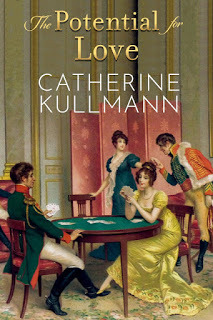
The Inspiration behind The Potential for LoveCatherine Kullmann
For centuries, marriage was dangerous for English women. The legal principle of coverture meant that, as a leading eighteenth-century jurist, Sir William Blackstone, put it, the very being or legal existence of the woman is suspended during marriage. A wife was at her husband’s mercy. She had no separate legal existence, her husband could deal with her person, her children, and her property as he pleased, and she had no recourse to the law, no matter how badly his treatment of her might be. It was almost impossible for a woman to sue successfully for divorce. If she left her husband, he could legally compel her to return to him. If he divorced her, she lost her reputation, her place in society, and probably her children.
Why, then, did women marry? At the same time, there was really only one career open to women, and that was marriage. From girlhood, they were trained to manage their husband’s home, bring up his children, and support him in his endeavours according to his station in life. If they failed to marry, they remained dependent on their parents, and later on their brothers, unless family circumstances required them to seek a menial, poorly paid position elsewhere.
Wise parents did their best to secure their daughters’ financial security through pre-nuptial marriage settlements. It was vital that these contracts be signed before the marriage—afterwards was too late to escape a fortune-hunter who, through the marriage, had already acquired all his bride owned. In the case of an elopement, or abduction and forced marriage, the most a parent or guardian could do was withhold any promised dowry or future inheritance—a decision unlikely to ensure the future happiness of the bridal couple.
Is it any wonder, then, that when considering matrimony, a sensible woman would give considerable thought to the character of any prospective husband? Was he dependable, kind, considerate, generous, possessed of sufficient means to support her and her children in the style to which she is accustomed? This must be the foundation for any marriage. Not every woman had a choice of suitors. Depending on her family circumstances, she might have to agree to a marriage based less on compatibility or even mutual attraction than on availability coupled with desperation. Think of Charlotte Lucas in Pride and Prejudice, who tells Elizabeth, “All I ask is a comfortable home. Considering Mr. Collins’s character, connection, and situation in life, I am convinced that my chance of happiness with him is as fair as most people can boast on entering the marriage state.” This was a fair assessment provided she could ignore the fact that he was a pompous fool, obsequious to a fault towards his social superiors and, in particular, his patroness Lady Catherine.
Today, in western societies, it is customary for the sexes to mix freely at school, university, and in the work-place. People start dating in their teens and may have tested several partnerships before committing themselves to matrimony. Women do not need to marry for security or a comfortable home—they can work to provide this for themselves. And, most importantly, if they feel they have made the wrong choice, not only will the law support them in reaching a fair and equitable divorce, it will also protect them against an abusive spouse. But when writing, or indeed reading, historical fiction, we must put all of this out of our minds.
Arabella, heroine of The Potential for Love, is about to embark on her fourth Season; in today’s terms, we would say she is in her final year of university and ready to graduate. She is ready to marry, eager to move on from her life as a dependent daughter, to manage her own household and start a family. A viscount’s daughter with a good dowry, she can expect to marry into a family whose circumstances are as good as or better than her own. But is that what she wants? What is more important to her, the man, or his position? And what sort of a relationship does she want with him? A distant, more formal one of the sort that is not uncommon among the haut ton or the close, loving companionship she has seen in her own family?
Marry in haste, repent at leisure, the old saying goes. The rest of your life is a very long time to be miserable, Arabella’s mother warns her. Yet, given the restrictive etiquette of the time, how can she get to know any man well enough to be sure she can entrust herself and her future children to him? How can she know that he is the right man for her or if he will agree to the sort of marriage she wants?
As the Season progresses, she finds herself pondering these questions more and more. She is courted by several men, including the eldest son and heir of an Earl, a marquess’s younger brother, and an up-and-coming member of parliament. All are eminently eligible, and, initially, at least, she finds each attractive. And then there is Thomas, the rector’s son, an officer newly home for occupied France. She has known him and his parents all her life. She feels comfortable with him.
Thomas, too, has decisions to make. The long war with France is over, the enemy defeated. He has finally come home, but to a country he hardly knows—he has served abroad all his adult life. He is restless. Does he want to be a peace-time soldier, chiefly occupied in ceremonial display, forever ready for action but rarely called upon? Or does he want to serve abroad, the strong arm of an occupying or colonial power? If he leaves the army, what will he do? If he can support a wife and family, where will he find a wife? He may be on calling terms with the Malvins, but their world is not his.
The internal questions that we all must answer when we come to a crossroads in our lives form the underlying theme of The Potential for Love. The decisions become more complex when we fall in love and are obliged to consider not only our own wishes but those of another, special person. And then there are the curve balls that life throws at us. Thomas and Arabella have their share of these, too.
I enjoyed the challenge of resolving Arabella’s and Thomas’s dilemmas while remaining true to the ethos and mores of their time. I hope you enjoy their story.
©Catherine Kullmann 2020
Purchase
Amazon Waterstones Barnes and Noble
The Potential for Love is also available in Paperback and as eBook and is free to read with Kindle Unlimited subscription.
Amazon Kindle
Waterstones (Paperback)Barnes and Noble (Paperback)

Catherine Kullmann
I was born and brought up in Dublin and moved to Germany on my marriage in 1973. Before my marriage, I was an administrative officer at the Department of Finance in Dublin. I worked as an attaché at the Irish Embassy in Bonn until my eldest son was born. Following a twelve-year stint as a full-time mother, I joined the New Zealand Embassy in Bonn, where I was an administration officer. My husband and I returned to Ireland in 1999, and in 2009, following a year’s treatment for breast cancer, I took early retirement from my position as Director of Administration and Human Resources at a large Dublin law firm.
I have always enjoyed writing. I love the fall of words, the shaping of an expressive phrase, the satisfaction when a sentence conveys my meaning exactly. I enjoy plotting and revel in the challenge of evoking a historic era for characters who behave authentically in their period while making their actions and decisions plausible and sympathetic to a modern reader. In addition, I am fanatical about language, especially using the right language as it would have been used during the period about which I am writing. But rewarding as all this craft is, there is nothing to match the moment when a book takes flight when your characters suddenly determine the route of their journey.
The first quarter of the nineteenth century was one of the most significant periods of European and American history, a period whose events still resonate two hundred years later The Act of Union between Great Britain and Ireland of 1800, the Anglo-American war of 1812 and the final defeat of Napoleon at the Battle of Waterloo in 1815 all still shape our modern world. The aristocracy-led society that drove these events was already under attack from those who saw the need for social and political reform, while the industrial revolution saw the beginning of the transfer of wealth and ultimately power to those who knew how to exploit the new technologies.
I write historical fiction set against this background of off-stage wars, of women frequently left to fend for themselves in a patriarchal world where they have few or no rights but must make the best lives they can for themselves and their families. While real people sometimes have walk-on parts, the protagonists and their stories are pure fiction. As well as meeting their personal challenges, they must also cope with external events and the constraints imposed by society. The main story arc is romantic. I am particularly interested in what happens after the first happy end—how life goes on around the protagonists and sometimes catches up with them.
Connect with the Author
Website • Twitter • Goodreads.
October 19, 2020
The inspiration behind His Castilian Hawk by Anna Belfrage
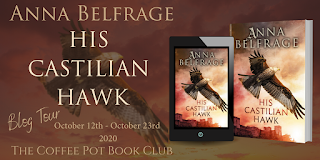
Author InspirationHis Castilian HawkAnna Belfrage
What inspired my latest medieval release?
Many years ago, I read a book by Sharon Penman called Falls the Shadow. I still read that book regularly—and cry my eyes out every time in the same place: the Welsh prince, Dafydd ap Gruffydd is forced to watch as his wife and children are carried out of his life without even being allowed to bid them farewell.
Dafydd went to his maker in October of 1283, his death an orchestrated and excruciating agony. He was being punished by Edward I for having rebelled against the English—but in truth, he was also being punished because this was personal for Edward. Dafydd had more or less grown up at the English court, and for him to turn round and bite the hand that fed him…
For those entirely unfamiliar with the events that went down in the early 1280s in Wales, a very brief recap is that Edward I decided he was done with handling Welsh princes and their rebellious ways and so mounted a full-scale invasion, this in response to the rebellion that flared up in 1282, instigated by Dafydd. At the time, it was Dafydd’s older brother, Llywelyn, who was the prince, and that poor man had other things to concern himself with, principally the recent death of his wife in childbirth. But when Dafydd rebelled, Llywelyn could not sit to the side—to do so would shame him before their countrymen.
What is somewhat ironic in all this is that for most of their lives, Dafydd and Llywelyn had been on opposing sides, Dafydd standing with the English as first Edward’s father, Henry III, then Edward himself chipped off one piece after the other from Wales. Dafydd wanted lands in Wales. Due to his constant betrayals, Llywelyn was reluctant to give his brother anything—until the Treaty of
Aberconwy in 1277 forced the defeated and humiliated Llywelyn to do so.
Back to 1282: Llywelyn was killed in December, Dafydd became prince and spent the coming six months or so constantly evading Edward I’s men, dragging most of his family with him. And here, peeps, is where we get back to the lady who inspired my latest book, His Castilian Hawk, namely Dafydd’s wife Elisabeth de Ferrers.
Elisabeth had no say in who was to be her second husband. As a young widow, she was ordered by Edward I to marry his favourite Welshman. We have no idea if it was a happy marriage, but by the early 1280s, Elisabeth and Dafydd had been married for fifteen or so years and had several children together, of which we know of two surviving sons and one baby daughter. When Dafydd eventually was captured by the English, his wife, and their two youngest children were also captured. Some weeks later, their eldest son was also taken captive by English troops.
Over the coming months, Elisabeth was to suffer a sequence of losses. When Dafydd was executed, his sons were forcibly separated from their mother and locked up for life in Bristol Castle. The youngest boy, Owain, was around seven, and I can only imagine the pain Elisabeth must have felt as her boys were taken from her. She probably hoped it was only temporary, but soon enough she’d realise she would never see her sons again. Her youngest child, baby Gwladus, was also taken from Elisabeth and sent off to a convent. The baby was to be raised by nuns to become a nun and would have no memories of her parents of her family.
In a matter of months, Elisabeth had lost not only her husband but also all of her children, making her an utterly unimportant person—at least from the perspective of the medieval chroniclers. In 1283, Elisabeth disappears from recorded history, and we do not know what happened to her. Some sources make it possible she returned to Wales and died there in 1287, but whether or not that is true, we do not know. With the death of her husband and the loss of her children, Elisabeth becomes a ghost.
In His Castilian Hawk, Elisabeth gets some more airtime. Even if she is not the protagonist, she plays a fundamental role in shaping Robert FitzStephan’s life (and an indirect one in turning both Robert’s and his wife’s existence upside down). Plus, I have allowed myself to speculate on what may have happened to her in the aftermath of her husband’s death. I’m not entirely sure Elisabeth would be grateful for the life I offer her, but it is my belief she would have loved the opportunity to curse Edward and his wife Eleanor to hell and back for what they did to her and her children!
Elisabeth is mostly a footnote in history. And yet she lived and breathed, wept and laughed—at least until that day when a vengeful king ripped her heart in two by permanently separating her from her babies. In His Castilian Hawk, she does not change history (not entirely), but at least she gets to share her grief and anger at the cruel blows fate dealt her. She deserves that, I think!
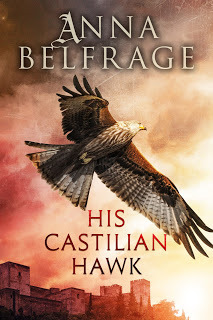
For bastard-born Robert FitzStephan, being given Eleanor d’Outremer in marriage is an honour. For Eleanor, this forced wedding is anything but a fairy tale.
Robert FitzStephan has served Edward Longshanks loyally since the age of twelve. Now he is riding with his king to once and for all bring Wales under English control.
Eleanor d’Outremer—Noor to family—lost her Castilian mother as a child and is left entirely alone when her father and brother are killed. When ordered to wed the unknown Robert FitzStephan, she has no choice but to comply.
Two strangers in a marriage bed is not easy. Things are further complicated by Noor’s blood-ties to the Welsh princes and by covetous Edith who has warmed Robert’s bed for years.
Robert’s new wife may be young and innocent, but he is soon to discover that not only is she spirited and proud, she is also brave. Because when Wales lies gasping and Edward I exacts terrible justice on the last prince and his children, Noor is determined to save at least one member of the House of Aberffraw from the English king.
Will years of ingrained service have Robert standing with his king or will he follow his heart and protect his wife, his beautiful and fierce Castilian hawk?
Purchase at:
Amazon
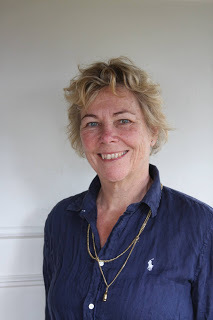
Anna Belfrage
Had Anna been allowed to choose, she’d have become a time-traveller. As this was impossible, she became a financial professional with two absorbing interests: history and writing. Anna has authored the acclaimed time-travelling series The Graham Saga, set in 17th century Scotland and Maryland, as well as the equally acclaimed medieval series The King’s Greatest Enemy which is set in 14th century England.
More recently, Anna has published The Wanderer, a fast-paced contemporary romantic suspense trilogy with paranormal and time-slip ingredients. While she loved stepping out of her comfort zone (and will likely do so again ) she is delighted to be back in medieval times in her September 2020 release, His Castilian Hawk. Set against the complications of Edward I’s invasion of Wales, His Castilian Hawk is a story of loyalty, integrity—and love.
Connect with Anna
Website • Twitter • Facebook • Amazon Author Page.
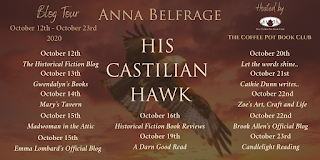
October 12, 2020
Book Spotlight and Excerpt: The Sign of the Blood by Laurence O'Bryan
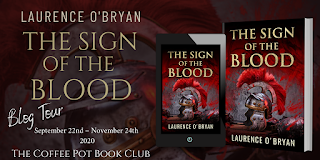
The first Christian emperor faces ruthless enemies on his journey to power.
Cool mist settles over the legion advancing toward the Persian army. Constantine, the son of an emperor, the Roman officer leading the attack, tells his men to halt - something is wrong.
Before long, the battle rages. He frees a slave named Juliana. She is half-Persian and half-Roman. As they are pursued to Britannia over land and sea, he learns that she can see the future - his future.
It is 306A.D., long before Constantine the Great converted to Christianity and became the first Christian emperor.
To ensure he survives, he must eliminate his enemies. But who must die first? The priestess, Sybellina, who joined them in Rome and practices dark and seductive magic? Or the brutal legion commanders who surround his father? Or, as Juliana suspects, are those who want him dead even closer?
A gripping historical novel about Constantine’s bloody rise to power, the woman who helped him, and the real reason he supported a persecuted Christian minority, a decision which changed the world into the one we know.
Praise for The Sign of the Blood
"Exciting and original." - SJA Turney, author of Praetorian.
“It is an enthralling story from start to finish…” The Coffee Pot Book Club
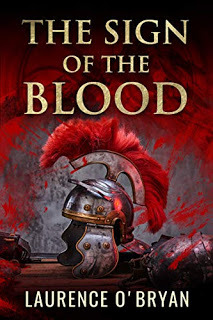
EXCERPT
Lower Armenia, 297A.D.,
Constantine looked up through a gap in the canopy of trees a flock of birds flew past, silhouetted against an azure blue sky. They were hurrying, beating their wings as if, like the army he was attached to, they were being pursued, chased by the Persian army. He hoped their flight did not auger his fate. Every action he took part in would be judged to a high standard, not only because the junior Tribune of the Jovian guard, the Emperor of the East’s personal legion, had to be regularly assessed for his ability to lead, but also because he was Flavius Valerius Constantine, the son of the Emperor of the West.
When he looked back down along the steep embankment, a sudden dizziness almost overcame him. He had to close his eyes to steady himself. When he opened them, Persian horsemen had entered the narrow track below. There were ten of them.
The observation point he’d picked was a good one, behind a drift of fallen pine tree branches, on a bed of quills, where he could peer through gaps in the brush to see the track below.
“Awoooooooooooo.” A distant wolf howl cut through the air.
just as abruptly, it ceased. A hush settled over the forest. The strap at his right knee was cutting into him again. It could wait, movement would give them away.
He lay still, breathing softly. His dirty crimson cloak covered him almost completely, letting him fade into the forest gloom.
His companion shifted his position slightly. Constantine moved a little forward to get a clearer view of the path below. His hand gripped the pommel of his sword.
The lead Persian scout halted, raised a gloved hand to stop the riders behind him. He scanned the forest and the incline. His helmet glinted as he turned one way then the other.
Then the Persian scout stared straight at him. Constantine stared back. There was no way the man could see him. A column of evening sunlight shone in the air between them. Midges and dust motes swirled in its beam. Perhaps the man was looking at them.
The Persian riders whispered to each other. Their lead scout threw his head back, sniffed the air.
"Find the Persian camp," Constantine had been told before he’d led the scouting mission out that afternoon. The officer hadn’t bothered repeating what almost everyone knew, that no other scouting mission had managed the task in the previous three nights, since they’d been skirting the mountains.
A blood-red ant crawled onto the back of Constantine’s hand. His skin prickled. He watched as it navigated its way up his thickly haired arm. Then another appeared, on his middle finger.
Sclick. He scanned the line of horsemen. One of the Persians had drawn his sword and was examining it.
The lead Persian scout shook his head as if irritated, said something which made those around him laugh, then backed his horse off the trail and waved those behind him to pass him by.
Towards the rear of their line were four prisoners, boys, pickings from a local village most likely, all naked, bound at the wrists, and trotting to keep up with the horse each was roped to. Some of their faces were purple from bruising. One whimpered as he hobbled along trying to keep up.
Anger rose through his chest. Even the most debauched Senators in Rome sickened at the practices of the Persian King. If the stories he’d heard were true, blinding would be the next thing in store for that boy. His terrified screams as they did it would put fear deep and far into the hearts of the others who’d been taken with him.
When the last of the riders and prisoners had gone past the Persian officer followed.
Constantine waited, listening to the birds, until the sound of the horsemen died. Then he stood, turned to the Armenian guide rising to his feet beside him.
"Let’s follow them,” he whispered.
"Are you sure? This is why your previous scouts went missing. They got too close to the enemy."
Constantine jabbed a finger into the man's chest, hard. "We’re not going back empty-handed. But we’re not following this track either."
“Where are we going?”
"That way.” Constantine pointed at the ridge, visible through the trees, in the direction the Persian had taken.
The Armenian sighed. "My friends tell me you Romans will lose this war. That I should change sides, before it’s too late. The Persians pay well, they tell me."
Constantine stepped back, as if measuring the distance between them. A bird took noisy flight through the trees.
“Your Emperor should give command of these scouting missions to men who know these lands, not to Romans." The Armenian spat, then checked his sword hung properly from his belt.
"You know you are lucky," Constantine replied.
"Lucky?” The Armenian speedily brushed dirt and twigs from his stained leather tunic, then threw his hands in the air. "I'm a scout attached to a Roman army being chased by a Persian force intent on its annihilation. Yes, Fortuna surely smiles on me."
"No Lucius, you're lucky because I’m giving you another chance to prove how loyal you are.” Constantine raised his sword a little from its scabbard.
Lucius’ eyes widened.
“We will find the Persian camp, Lucius.” He let his sword drop back into its scabbard.
"Isn’t Roman gratitude a wonderful thing." Lucius turned on his heel, headed for where the horses were hobbled downwind.
When Constantine reached the horses, Lucius had already mounted. He didn’t look at Constantine, just kicked his horse and headed away in the direction Constantine had pointed, sitting high in his saddle, scanning all around as he went.
PURCHASE
 Laurence O'Bryan
Laurence O'BryanI spent twenty years studying Roman history and reading every book about Constantine the Great I could find. I also visited numerous sites where my Roman series is set, including in London, where I lived for ten years, Jerusalem, Rome, Trier, York, Nicomedia, and Istanbul.
The first novel in the series, The Sign of The Blood, is about the rise to power of Constantine the Great, the women who helped him, and the others who wanted him dead.
The Road to The Bridge, the second novel in the series, is about the lead up to the battle of the Milvian Bridge in 312 A.D. and how Constantine the Great lured Maxentius, his rival emperor, out of Rome.
The third novel in the series, The Cursed City, is about the dedication of New Rome, later to be called Constantinople, and how Constantine fell out with his wife, Fausta, and his son Crispus, and what he had to do to survive.
To join the mailing list and receive news of these books use this link: http://bit.ly/TSOTBseries
There are five novels in the puzzle series, The Istanbul Puzzle, The Jerusalem Puzzle, The Manhattan Puzzle, The Nuremberg Puzzle, and The Cairo Puzzle.
There is a story link from The Istanbul Puzzle to The Cursed City.
My books have:
* Achieved #1 ranking on Amazon,
* Been translated into 10 languages.
My roots go back to a small estate deep in the Mountains of Mourne near the Silent Valley, in County Down, Northern Ireland.
I went to school in Dublin, drank way too much, studied English and history, then business, then IT at Oxford University.
My research has taken me all over the world, from San Francisco to deep in the Muslim world. There are secrets everywhere. I enjoy writing about them. I hope you enjoy reading about them.
Connect with Laurence
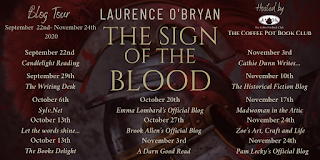
October 6, 2020
A new perspective on the history of Sir Francis Drake, By Tony Riches, author of Drake – Tudor Corsair

A new perspective on the history of Sir Francis Drake,By Tony Riches, author of Drake – Tudor Corsair
I’d been planning an Elizabethan series for some time, as my aim is to tell the stories of the Tudors from Owen Tudor’s first meeting with Queen Catherine of Valois through to the death of Queen Elizabeth.
I decided to show the fascinating world of the Elizabethan court through the eyes of the queen’s favourite courtiers, starting with Francis Drake. I’ve enjoyed tracking down primary sources to uncover the truth of Drake’s story – and discovering the complex man behind the myths.
It will come as little surprise that just about everything you were taught about Drake at school was wrong, so here are a few historical corrections from my research:
Drake was not first to sail around the world.
Drake recreated the Portuguese explorer Ferdinand Magellan’s circumnavigation. He was the first British captain but nearly suffered the same fate as Magellan, (who was killed by islanders). Drake’s flagship, the Golden Hinde, was the only one of his fleet to return home - with only fifty-six men, three years after setting sail and 36,000 miles later.
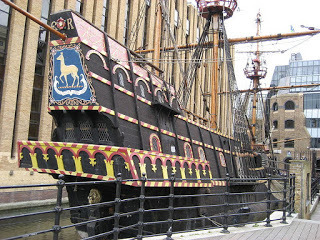
Replica of the Golden Hinde – Wikimedia Commons
There was a bowling green at Drake’s manor house, but the story first appeared thirty-seven years after the Armada. From what we know of the tide and weather on that day, Drake’s casual behaviour may well have been justified, but I believe it’s all part of the myth around Drake’s life, which he had good reason to encourage.
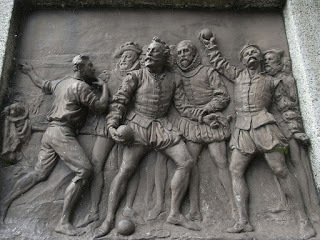
Tavistock memorial plaque - Wikimedia Commons
Drake didn’t profit from the slave trade.
As a young man, Drake sailed with John Hawkins on slave-trading voyages, but once he had his own ships, he freed any slaves he found and became friends with a former slave named Diego. Diego helped Drake forged an alliance with the Cimarrons, escaped slaves who established settlements in the forests of Panama. Diego returned to Plymouth with Drake, where he lived for the next four years, and later saved Drake’s life during an attack by islanders.
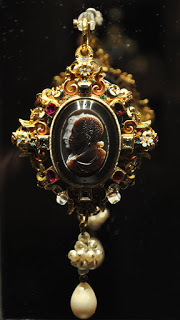
The Drake Jewel – Wikimedia Commons
Evidence of Drake’s views can be seen in the Drake Jewel, on display at the V&A Museum in London. Queen Elizabeth gave a miniature portrait on leather to Drake, and he had the jewel created around it. The design he chose is unusual, and has been described as a symbol of black superiority, as the London gemstone cutters made dramatic use of the contrasting dark and light layers of the sardonyx to create the figure of a white woman, eclipsed by an African man, with the mantle worn by Roman emperors as a sign of his high status.
Drake can be seen wearing the jewel at his waist in his portrait by Flemish painter Marcus Gheeraerts the Younger, now at the National Maritime Museum, Greenwich, London:
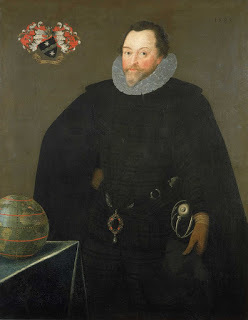
Wikimedia Commons Courtesy of the National Maritime Museum,Greenwich, London, Caird Collection.
Drake was not knighted by Queen Elizabeth
The famous image of Drake being knighted by a grateful Queen Elizabeth is a Victorian invention, as she cleverly co-opted the Marquis de Marchaumont, ambassador of France, to do the job, reinforcing her alliance with France against the Spanish.
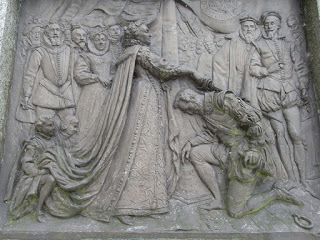
Tavistock memorial plaque - Wikimedia Commons
Francis Drake was a self-made man, who built his fortune by discovering the routes used by the Spanish to transport vast quantities of gold and silver. He had a special relationship with Queen Elizabeth, and they spent long hours in private meetings, yet was looked down on by the nobility even after he was knighted. His story is one of the great adventures of Tudor history.
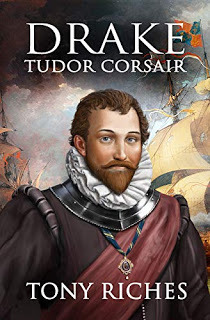
1564
Devon sailor Francis Drake sets out on a journey of adventure.
Drake learns of routes used to transport Spanish silver and gold, and risks his life in an audacious plan to steal a fortune.
Queen Elizabeth is intrigued by Drake and secretly encourages his piracy. Her unlikely champion becomes a national hero, sailing around the world in the Golden Hind and attacking the Spanish fleet.
King Philip of Spain has enough of Drake’s plunder and orders an armada to threaten the future of England.Buy Links
Amazon UK • Amazon US • Amazon CA • Amazon AU
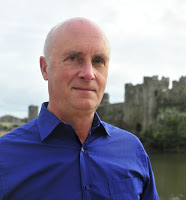
Tony Riches
Tony Riches is a full-time UK author of best-selling historical fiction. He lives in Pembrokeshire, West Wales and is a specialist in the history of the Wars of the Roses and the lives of the early Tudors. Tony’s other published historical fiction novels include: Owen – Book One Of The Tudor Trilogy, Jasper – Book Two Of The Tudor Trilogy, Henry – Book Three Of The Tudor Trilogy, Mary – Tudor Princess, Brandon – Tudor Knight and The Secret Diary Of Eleanor Cobham.
For more information about Tony’s books, please visit his website tonyriches.com and his blog, The Writing Desk and find him on Facebook and Twitter @tonyriches
September 20, 2020
Spotlight on novelist Kathleen Harryman
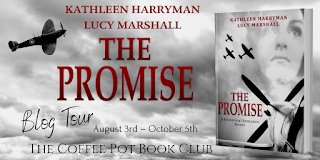

Kathleen Harryman
Fun Facts
Ever since I can remember, I have wanted to write. As a little girl, long before I could write or read, I would sit on my bed with my toys and tell them a story. Sometimes I would lose myself to the fanciful thought that I was a ‘great writer,’ and with pen and paper, I would write my novel. Not being able to write at the time may have put some children off. But if I could make a mark on the paper, I was writing.
I used to be so scared of the dark that my parents bought a radiator that gave out a soft red glow. The house didn’t have central heating, I know, it’s incredible!
I have a twin sister. We are identical, and people still get us mixed up today! Of course, like most kids, we used our likeness to our advantage. Mum was once called into school because we kept swapping our name badges round.
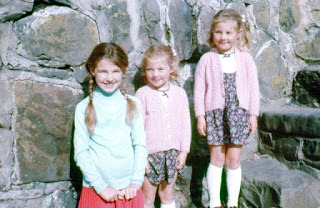
I am the little girl on the right
The perfect part of the day is that time in the morning when there is no one else around but me. I sit hugging my coffee, watching the birds swoop on the bird table. It is peaceful, without stress or thought and indulgent.
I still have the teddy bear my dad gave me when he brought mum, my sister, and me back from hospital. That bear and I have been through a lot. I do feel, however, that I have managed to come out of our relationship looking better (for the moment). His white fur (or what is left of it) is now grey, and his little red paws are wearing away. His head wobbles to one side. But he still smiles at me and sits proudly on his chair.
***
How far would you go to keep a promise?In the heat of battle, one man's promise to another will be tested.
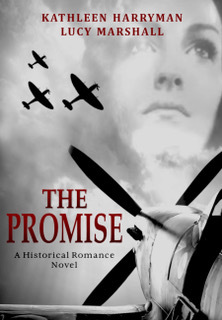
September 1939
As Britain is gripped by the fear and uncertainty of war, Tom Armitage stands to gain the one thing that he never thought possible - his freedom.
Rosie Elliot sees her future crumbling to dust as Will Aarons leaves Whitby with Jimmy Chappell to fight in the war. As she begins work at The Turnstone Convalescent Home, Rosie finds something she thought she had lost. Friendship. But friendship soon turns to love. Can this new love replace Will?
This is not an ordinary love story.
It's a story of love, loss, courage, and honour.
Of promises that must be kept or risk losing everything you've ever held dear.
Purchase atAmazon
***About the Author
Kathleen Harryman is a storyteller and poet in the historically rich city of York, North Yorkshire, England, with her husband, children and pet dog, and cat.
Kathleen was first published in 2015, a romantic suspense entitled The Other Side of the Looking Glass. Since then, Kathleen has developed a unique writing style that readers have enjoyed, and she became a multi-genre author of suspense, psychological thrillers, poetry, and historical romance.
Connect with Kathleen
Website• Facebook • Instagram • YouTube • Twitter • IAN
September 17, 2020
New release - Be There Soon by recording artist Noah James
September 15, 2020
Book Spotlight and Excerpt: The Queen's Devil (A William Constable Spy Thriller) by Paul Walker
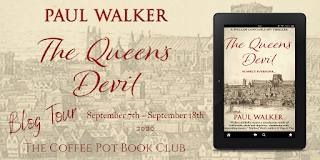
1583.
William Constable, recently married astrologer and mathematician, has settled into routine work as a physician when he is requested to attend two prisoners in the Tower of London. Both are accused of separate acts treason, but their backgrounds suggest there may be a connection.
Sir Francis Walsingham and Lord Burghley urge William to discover further intelligence from the prisoners while tending their injuries from torture.
The agent's investigations lead him to the French Embassy, which lies at the heart of a conspiracy which threatens the nation.
Through his enquiries, an unsuspecting William becomes entangled in a perilous web of politicking and religious fervour.
The threat comes from one the most powerful men in the English court – one referred to as the Queen’s Devil.
William faces a race against time to unpick these ties, climaxing in a daring raid on the Embassy.
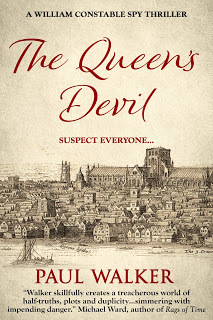
Excerpt
William Constable is at the Tower of London to tend the injuries from torture of the alleged conspirator, John Somerville …A manservant opens the door, and a short, round woman exits. She is wrapped in a heavy grey cloak, and her shoulders shiver at the sudden loss of warmth. I hazard she is no more than twenty-five, and the cover is a fine wool, so this may be the lady mentioned by Burghley.
She says, ‘Doctor Constable, I am Mary Brydges. I will take you to Master Somerville.’ She meets my gaze with an air of self-assurance and hands my note back.
‘Good day to you, Lady Brydges. I am grateful for your consideration in leaving the comfort of your chamber to guide me.’
She smiles and dismisses my escort with a wave of her hand. ‘We have moved him to a chamber in this tower.’ She points ahead. ‘We saw no reason to subject you to the dismal conditions of his examination cell. I have placed bowls of clean water and linen wraps on a table there for your use.’
I dip my head to show appreciation of her kindness. We climb wooden steps to the tower door, which is locked and barred. She gestures with a gloved hand, and I answer by pounding the door with my fist. It is opened by a thickset man with a bushy beard, who wipes his hands down a leather jerkin before bowing deeply and making way for our entrance. This will be the guard room. Two men are sat at a table spread with the pickings from carcasses of boiled fowl. It seems our entry is unexpected. After a moment of uncertainty, they stand and bow stiffly. The first guard takes a ring of keys and leads us up a stone stairway to the next storey. He unlocks a door and leaves us. I want to reach for the handle, but she places her hand on my arm and watches as the guard descends. When he is gone, she says, ‘Do you wish me to enter with you and introduce Master Somerville? I should warn that his body has suffered cruel handling, and his mind is insecure. He has been informed that I have summoned a physician to tend his wounds, but my telling may be already forgotten.’
‘Thank you, Lady Mary, an introduction and repeated explanation may be helpful in his acceptance of my presence.’ She has a pleasant aspect and has been thoughtful in her preparation. It is a wonder that a young woman of her disposition should be charged with the care of a tortured man in a place of grisly reputation.
I follow her into the chamber. It is a fair size, but with poor light. Only one window is unshuttered, and the flame of a single candle on a table sputters and protests at a waft from the open door. The walls are bare stone. A small fire takes some of the nip from the air. As my eyes become accustomed to the gloom, a bed appears in the far corner, and I surmise that the dark hunched figure under the covers is Somerville. Mary explains that only one of the three windows is glazed, and she assumed we would favour comfort over light. She takes the candle, lights another, and carries it to the bed.
‘Master Somerville, I have brought Doctor Constable to ease your discomfort.’ She speaks in a low soothing voice, as a mother to her babe.
The bundle of covers stirs as Lady Mary touches my arm, hands me the candle, and signals she will leave us. I pull up a stool, sit by the bed, and remove my bag of medicines from a shoulder. There is grunting and huffing as he struggles to rise, then a sigh as his body collapses. I hold the candle close, see his head, and… lurch back at the grotesque disfigurement of a face. Beneath a straggle of long fair hair emerges a swollen misshape with a deep cut to the forehead and scabbed holes in each cheek; one with a flap of raw pink flesh exposed.
I say, ‘I am Doctor William Constable. Lady Mary has asked me to tend your wounds. To begin, I will bathe your face.’
I make to rise and go to the table, but he moans and levers himself up on an elbow. He mutters a word I do not understand. He tries again. It is as though he speaks through a mouthful of pebbles. I move my ear to his mouth. I think I understand; he says ‘feet’. Does he wish me to examine them? I put the candle on the floor, hook my hands under his shoulders, and help him to sit. A big man, but weak with loose flesh around his bones, signifying he has been starved of food. He squeaks and groans pitifully until he is upright. He draws a breath and utters more words. Is one… ‘angel’?
Mystified at first, then I say, ‘Do I understand you refer to the Lady Mary as an angel?’
He nods his head slowly in confirmation. In his situation, it may be that any who show sympathy are regarded as extraordinary in their kindness. I lower the candle to his feet, which dangle over the edge of the bed. They are an ugly sight; bent, broken, and bruised. It appears his tormentors have taken a hammer or other weight to them. I hesitate to touch as I am sure the pain will be terrible. Instead, I delve into my satchel and remove a jug of Brandywine. There is a cup on the table. I hand him a full cup, saying he should drink to deaden the pain.
I pose questions about his injuries. Has he been racked? No. More broken bones? He grunts and points with difficulty to his loose arm. I loosen the sleeve of his blouse and gently press my fingers until he winces. His wrist is broken or disjointed. Through further questioning, I find he has burn marks on his chest and buttocks, with some blistered and weeping. The stench from his mouth causes me to blink and hold my breath. His tongue is crusted with dried blood and badly swollen, but I get no sense from him of how his facial injuries were made. The poor man is wrecked. I shake my head to dismiss thoughts of the men who took delight in the ingenuity of their cruelty. It will take some time to dress his wounds and ease his hurt.
He drinks four cups of Brandywine before I bathe his wounds, apply ointments, and wrap with cloth. It is a slow process and past noon before I have finished. I enlist Lady Mary’s help in the preparation of a hot soother of comfrey and willow bark, which he should take three or more times each day. I also leave him with a small jar of oil of cloves to apply to the tender areas of his mouth. There will be no profit in attempting conversation today. I must return tomorrow.…
Praise for Paul Walker:
“Walker skilfully creates a treacherous world of half-truths, plots and duplicity... simmering with impending danger.” Michael Ward, author of Rags of Time.
"A gripping and evocative page-turner that vibrantly brings Elizabeth's London to life." Steven Veerapen, author of A Dangerous Trade.
"Full of convincing characters both historical and imagined." Peter Tonkin
Purchase Link
Pick up your copy for free with Kindle Unlimited subscription.
Amazon
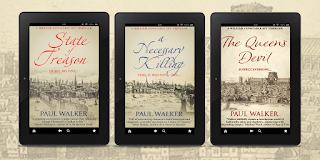
About the Author

Paul Walker
Paul is married and lives in a village 30 miles north of London. Having worked in universities and run his own business, he is now a full-time writer of fiction and part-time director of an education trust. His writing in a garden shed is regularly disrupted by children and a growing number of grandchildren and dogs.
Paul writes historical fiction. He inherited his love of British history and historical fiction from his mother, who was an avid member of the Richard III Society. The William Constable series of historical thrillers is based around real characters and events in the late sixteenth century. The first two books in the series - State of Treason and A Necessary Killing - were published in 2019. The third book, titled The Queen's Devil, was published in the summer of 2020.
Connect with Paul
Twitter • Facebook • Amazon Author Page.
September 2, 2020
The Coffee Pot Book Club: #BookReview: Scribbler Tales Presents: Escape from Berlin by Mary Ann Bernal
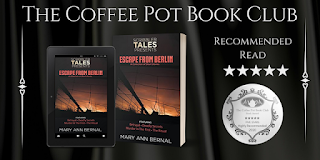
Lose yourself in five tantalisingly delicious bite-size short stories that are filled with action, drama, crime and broken promises — Scribbler Tales Presents: Escape from Berlin by Mary Ann Bernal is as enthralling as it is addictive.
Bernal is an author who always delivers, and I was really looking forward to diving into this anthology of short stories. All of the stories in this collection are rich in detail and highly entertaining. Not only are the stories immensely readable, but they are also impressively narrated. This is an anthology that is not only bold in its delivery but immensely successful as well.
Each of the stories in this collection read like a snap-shot in time. What happened before, and what happens after, we are not always told, but I think that is what makes this collection so exciting. Bernal is an author who is fabulous at creating tension and anticipation in her writing. Bernal is also very gifted at creating believable characters and situations. I thought this collection was absolutely sublime, and I enjoyed every word, every sentence, every syllable. Escape from Berlin was a wonderful story to start this collection. It is a desperate, heart-rending tale about war, loss, and betrayal. This story really tugged at my heartstrings. The protagonist is so brave and kind, which makes this story all the more heart-breaking. But it is also a reminder that nothing is fair in love and war. The second book in this collection, aptly named Betrayal, tells the story of a woman who trusts her husband with her deepest darkest secret. This story had me reaching for the tissues — it is such an emotional story filled with fear, pain and a terrible sense of injustice. Bernal has penned a story that is not only rich in content but also in historical detail. I thought this story was simply brilliant. Deadly Secrets is a story that is bursting with tension and drama. This crime thriller is filled with mystery and plot twists. I enjoyed this story very much, and I thought it was an excellent addition to the collection. I found myself swept away by the narrative as Murder in the First hurtled towards its dramatic ending. I thought this story was tautly gripping and incredibly engaging. The final story in the collection is called The Ritual. The Ritual was a fascinating story about a pagan cult. It is a desperate tragedy, and it was one of the stories that really impressed me with its ingenuity. I thought The Ritual was a fabulous story to end this collection with. If you are a fan of thrillers, then I think you will find Scribbler Tales Presents: Escape from Berlin by Mary Ann Bernal extremely agreeable. I really did enjoy all of the stories in this collection, and I cannot wait to read more from this very talented author. I Highly Recommend.
Review by Mary Anne Yarde.
The Coffee Pot Book Club.

Pick up your copy ofScribbler Tales Presents: Escape from Berlin
Amazon UK • Amazon US





